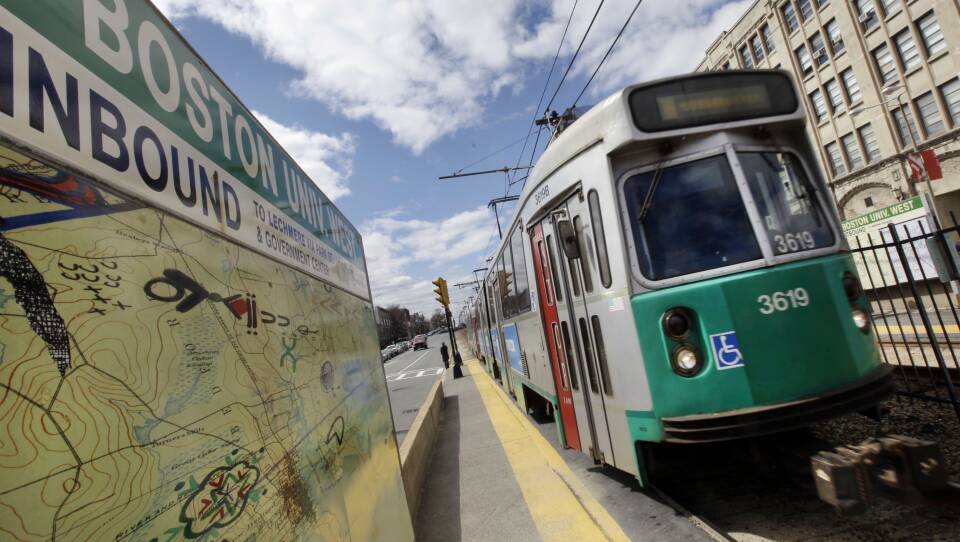At a business breakfast Thursday, Gov. Charlie Baker said Transportation Secretary Stephanie Pollack will undertake a search to find a long-term general manager of the MBTA, something the agency has lacked for years.
Chief Administrator Brian Shortsleeve has been serving as the acting general manager since the 2016 departure of Frank DePaola. It has been about five years since the MBTA embarked on a search for a new general manager, hiring Beverly Scott, who left the post two years ago.
"This needs to be a turnaround CEO," Baker told the Greater Boston Chamber of Commerce.
Baker said he also hopes the Fiscal and Management Control Board, which oversees the T, will extend its term. After relentless snow and cold devastated Greater Boston's transit system, lawmakers in 2015 created and empowered the five-member control board appointed by the governor to oversee the MBTA.
In almost weekly meetings, the Fiscal and Management Control Board has put on display the system's $7 billion maintenance backlog and other structural problems while embarking on controversial moves to privatize aspects of the service, cut extended weekend hours and raise fares.
The 2015 law establishing the control board allowed it to continue in existence until June 30, 2020 upon written recommendation by the board. Otherwise the control board dissolves June 30, 2018. The board's recommendation to remain in place must be "based upon specific findings that such 2-year period is in the best interest of the public and necessary to achieve operational stability and establish performance metrics for the authority."
In its year-and-a-half of existence, the control board has prompted protests by hiking fares and outsourcing its cash handling operations. James O'Brien, the president of the Boston Carmen's Union who was singled out for praise by the governor on Thursday, was among seven union officials arrested in October protesting privatization of cash handling. O'Brien's union more recently reached a multi-year contract agreement with T.
One major challenge that a new chief of the T will face is building up the agency's capacity to move capital projects and manage multi-billion-dollar infrastructure investments. The T is moving ahead on the Green Line trolley extension into Medford, after cost overruns put that on hold, and the agency in recent years failed to spend all of the capital dollars available to it.
"This needs to be a turnaround CEO, and not a traditional transit general manager," Baker said. "The new GM needs to have strong business experience in industries that provide direct service to customers and that deliver large-scale capital projects, because the T among other things is a large scale capital operation."
Listen to: Gov. Baker at Chamber Breakfast
Andy • 10 mins
Shortsleeve, who worked with Baker at General Catalyst, will remain chief administrator, which has more of a focus on the financial and business operations.
DePaola, a former highway administrator who resigned to focus on his health after a cancer diagnosis, stepped in after Scott's abrupt resignation amid the historic snows of 2015. Scott was hired in 2012 replacing interim General Manager Jonathan Davis, who replaced Rich Davey after Gov. Deval Patrick appointed Davey his transportation secretary.
"I think any organization is going to be benefit from stable leadership and while both Frank DePaola and more recently Brian Shortsleeve have done a great job, we're at the stage in turning the MBTA around where having a general manager and an extended control board for a period of years we think is really going to allow us to complete the next phase of fixing both the T and its infrastructure," Pollack told the News Service.
She said she wants the next general manager to stay "at least three years and five would be even better."
Shortsleeve and MBTA Chief Operations Officer Jeff Gonneville will serve on the search panel, and Pollack told reporters she has begun interviewing search firms.
"We're going to start the search pretty much immediately," Pollack said.
In his speech, Baker also touted the improvements in the MBTA's approach to snow, including snow-clearing equipment, modernized third rail, structured shifts to prevent burnout among employees, and an emergency operation center.
"I can't believe how much I know about this," Baker told the audience dining on eggs at the InterContinental Hotel, going on to describe how subway cars' traction motors will suck in snow from the tracks, shorting them out and disabling trains. The governor said that with new snow-fighting protocols he did not think the T had lost a single traction motor this season.
The need for coordination between city and state during the bitter cold and snow of late January and February of 2015 also helped form a friendship between the Republican governor and Boston Mayor Marty Walsh, a Democrat.
"The mayor and I became best friends as a result of the many conversations we had," Baker said.




